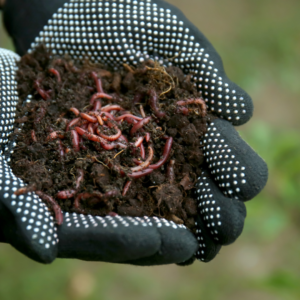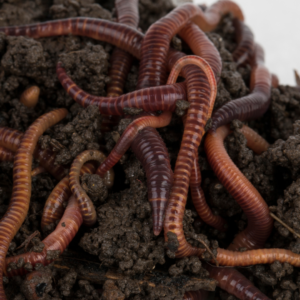Worm castings, or worm poop, are becoming increasingly popular in the gardening world. But what are the real benefits of worm poop for your garden, and what are the Disadvantages of worm castings?
Deep underground, worms break up the earth, aerating it and allowing plant roots to grow. Near the surface, compost worms eat decomposing matter and leave nutrient-rich castings in their wake.

Worms are also great for your garden because they help break down organic matter into smaller pieces that are easier for plants to absorb. By mixing worm castings into your soil, you can help improve its structure and increase its ability to hold nutrients—two things that make your garden healthier
Worm castings are highly desirable for any gardener who uses compost. For years, gardeners have encouraged and attracted worms to their soil, reaping the benefits of these underground workers.
First of all, worm castings are a great source of nutrients for plants. They’re packed with nitrogen (which helps promote plant growth), phosphorus (which helps roots), calcium (which helps strengthen plant cell walls), potassium (which helps build cell membranes), magnesium (which helps regulate photosynthesis), and other micronutrients like zinc and iron. This makes them a great addition to any garden soil.

But there are some downsides to using worm poop as fertilizer—for example, it doesn’t contain any nitrogen until after it has been composted for several weeks by red worms or other composting organisms!
Disadvantages of Worm Castings
If you live in a small space and don’t have a lot of land, worm castings may not be the best choice for you. Worm castings need to be made in a relatively large area, so if you don’t have enough space to dedicate to making them, it can be difficult to get enough to make it worth your while.
Additionally, worm castings take time and space to make—they can take up to two years before they are ready for use—so if you live in an urban environment where space is at a premium, they may not be the best option.
However, this factor is the only real disadvantage of worm castings. In every other way, they are the perfect fertilizer and soil amendment.
If you live in a region where temperatures can change dramatically from season to season, keep an eye on the health of your worms. If your composter becomes too wet or too dry, your worms will either die or escape. Either way, this leaves you with a compost system that no longer functions.
If you’re using a worm composter outdoors, it’s important to protect it from weather extremes. After all, worms are still living creatures and they need protection from rain, snow, and sun exposure.
You can also use a cover for your worm composter during the winter months when temperatures drop below freezing. This will keep them safe until spring arrives again!
I’ve seen a lot of people use leachate in their worm bins, but there are some things to keep in mind.
First, you should be sure that you’re using the leachate correctly. Leachate is the liquid run-off from the worm composter. A common mistake in worm farming is to use the leachate as if it were worm tea.
Worm tea is made by “brewing” fresh worm castings or vermicompost, whereas the leachate run-off from your food bin is liquid from the decomposing materials inside.
Leachate is better thrown down the drain than used as a fertilizer because leachate can contain harmful bacteria. If the leachate doesn’t have too much toxic bacteria, you can dilute it to use for watering your non-edible plants and pouring it on your outdoor compost heap.
The best test to check if the leachate is usable is to smell it. If it smells bad, then chuck it. Even if the leachate doesn’t smell, I would advise against using it on edible plants because of potentially harmful bacteria and other contaminants in there that could be harmful to humans and animals alike!
Thoughts on worm castings
Worm castings are an amazing thing.
They represent the symbiotic relationship that all animals have with nature, and they’re a great way to help your garden flourish.
There are many benefits of using worm castings, and it’s time you started exploring them.
So what are you waiting for? Get out there and start making some worm castings today!
If you are wondering where you can buy a good quality of worm castings? We are happy to say that we know an online store where you can buy good quality worm castings. It’s affordable and since it’s an online store you will save more time and effort.
Uncle Jim’s Worm Farm is our trusted online shop. It’s a great place to purchase worm castings if you are looking for good quality. They sell not just worm casting but almost everything you need to make your plants healthy like compost worms, mealworms, compost, organic fertilizers, and organic pest control, you can also make worm farms with worm food and bedding, and many more.
Click here to check their store and place an order.
